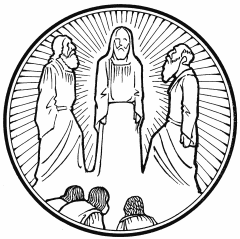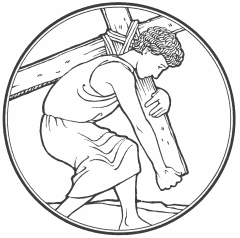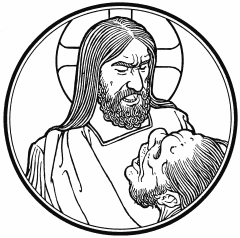 Grace, mercy, and peace to you from God our Father, and from our Lord and Savior, Jesus Christ, amen. The text for the sermon is the Gospel, which was read earlier.
Grace, mercy, and peace to you from God our Father, and from our Lord and Savior, Jesus Christ, amen. The text for the sermon is the Gospel, which was read earlier.
“’Tis Good, Lord, to Be Here.” Those are more than just words in a hymn. Those are words which Peter speaks to Jesus but are words that are unfathomable to us. For most of us, we never have that “mountain-top experience.” For Peter, James, and John, they did have the true “mountain-top experience,” literally, with Jesus. These three disciples were His chosen witnesses when He had raised Jairus’ daughter, and they would be with Him in Gethsemane. In Jairus’ home, Jesus had revealed Himself as having the power of God over death, for He is the very Son of God. In the garden, He would address God as His Father. The transfiguration would reveal His divine nature in a visible way and also support the truthfulness of all He had told the disciples in predicting His passion, which they were not ready to accept.
What happened on the mountain was startling to say the least. These three men, Jesus’ chosen disciples, had experienced something which they could not understand, but they knew that something extraordinary was taking place. Mark records, “And he was transfigured before them, and his clothes became radiant, intensely white, as no one on earth could bleach them.” In looking at the other Gospel writers accounts, we see similar descriptions: Matthew says “His face shone like the sun, and his clothes became as white as the light.” Luke reports, “The appearance of his face was changed, and his clothes became as bright as a flash of lightning.” This was a spectacle to see if there was ever a spectacle. We see the human nature of Christ and even His clothing was completely immersed with the brilliance of the divine nature. For most of the 33 years Jesus lived visibly in our world, He emptied Himself of the use of that divine glory. He masked His divine nature behind His human nature. On this occasion the Father permitted His Son’s divine nature to shine through the human shell.
As Mark tells it, there had been little rest for the disciples. They’d been chasing Jesus from town to town all around Galilee and beyond, find the reality of faith in unlikely people and fury from His enemies. They knew that Jesus was someone special, but they didn’t fully understand how special He was.
Just six days prior to the transfiguration, Jesus and His disciples had been scrambling around Caesarea Philippi. They had talked about who the people thought Jesus was. Then, Jesus asked them the question point-blank: “But what about you? Who do you say I am?” Peter famously replied, “You are the Christ, the Son of the Living God.” Just shortly after that, Peter pulled Jesus aside and began to rebuke Him because Jesus began to talk about His coming death and resurrection.
Now you have Jesus, James, Peter and John up to the mountain, probably to pray. They had probably done this time and time again; this was nothing new. It wasn’t unusual. It was ordinary. And for a while, it was.
Just like that, everything changed, in a twinkling of an eye. Things would forever be different for these three disciples. Looking up, they see Jesus transfigured, changed before their very eyes. What a sight that must have been to be in the full presence of the glory and majesty of God, to see the Shekinah, the very glory and dwelling of God.
But if that wasn’t enough of a “mountain-top experience,” we see standing and talking to Jesus both Elijah and Moses. What was interesting for the disciples is that they knew who Elijah and Moses were. These two men lived hundreds of years before the disciples and yet they recognized them. There was no Facebook fan page or Greats of the Old Testament trading cards which helped to identify them and yet they knew that standing before them were Elijah and Moses. Moses, the great representative of the Law, was God’s messenger for the Israelites. He led them to the Promised Land, though he himself was not permitted to enter. Moses died at Moab and was buried by the LORD Himself. Elijah, the great representative of prophecy, also appeared. Elijah was taken up to heaven bodily without experiencing death. Now they both stood before the three disciples talking with Jesus.
Look and see what is present on the mountain. You have the Bible. You have the Law represented in Moses, the Prophets represented in Elijah, and you have the Gospel represented in Jesus Christ. The Law was fulfilled in Christ. The Prophets pointed to Christ. Their presence and words assured the disciples that God’s purpose was being fulfilled in Christ, in exactly the way Christ had told them.
And now we return to Peter’s words: “Rabbi, it is good that we are here. Let us make three tents, one for you and one for Moses and one for Elijah.” Peter wanted to keep this moment frozen in history forever. He wanted to put on hold the coming work of Christ and keep this moment as glorious as it was. And why wouldn’t Peter want to preserve this memory? If everything that Jesus had said regarding His upcoming passion was true, then those events would start to play out very soon. Seeing Moses and Elijah here was all the proof that Peter needed to confirm that what Jesus had said was true. This glimpse of Jesus’ glory was meant to remind the three disciples—and it reminds us—that Jesus was, is, and ever will be the eternal Son of God.
To put the cherry on top, so to speak, there is one more occurrence that makes this event truly one to remember. Mark says, “And a cloud overshadowed them, and a voice came out of the cloud, “This is my beloved Son; listen to him.”” What a statement of bold proclamation, but what an earnest warning as well. This voice which can only be that of God identifies Jesus as His beloved Son but gives to them a message as well – to listen to Him. These were Jesus’ disciples. Of course they heard what Jesus said, what He had preached and taught the people. But God doesn’t tell them to hear, but to listen. There is a distinction to be made between the two. Yes, the disciples had heard Jesus, but were they truly listening to Jesus? All too often we hear Jesus and His Word, but do we listen to Jesus and His Word? Do we listen when He says that salvation only lies in Him and in no one or nothing else? Do we listen to the words Jesus speaks on the cross at His death, “It is finished,” indicating that by His death, He has defeated death on our behalf?
“’Tis Good, Lord, to Be Here,” to be here where God is, to receive His gifts of forgiveness, life, and salvation. Unlike on the mountain, we need not worry about the glory of the Lord leaving us, for we have Jesus’ very words, “I will never leave you nor forsake you.” In Jesus’ name, amen. Now the peace of God that passes all understanding, keep your hearts and minds through faith in Christ Jesus, amen.




